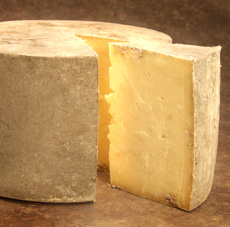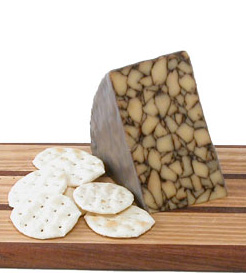
 You don’t have to go to the U.K.: This 60-pound wheel of bandage-wrapped farmstead Cheddar was made in California by Fiscalini Farmstead. Voted voted “Best Farmhouse Cheese” at the 2002 American Cheese Society Awards, it gets our vote, too. You don’t have to go to the U.K.: This 60-pound wheel of bandage-wrapped farmstead Cheddar was made in California by Fiscalini Farmstead. Voted voted “Best Farmhouse Cheese” at the 2002 American Cheese Society Awards, it gets our vote, too.
|
STEPHANIE ZONIS focuses on good foods and the people who produce them.
|
|
April 2006
Updated March 2009
|
 |
Cheddar: Ancient Cheese Of Monarchs
Page 2: Aging Cheddar ~ Mild, Medium & Sharp
Aging Cheddar
Once the cheese is out of the hoop or mold, it is aged to the desired degree. Traditional English Cheddar is wrapped with cheesecloth (a method called “bandaging”) and often develops mold on its exterior, a natural consequence of the aging process (a few varieties of Cheddar occasionally contain a little interior blue veining, as well). A young Cheddar might be aged for just a few weeks or months. It will be a semi-hard cheese with a smooth, slightly crumbly texture and a mild flavor. The longer a Cheddar ages, the sharper its flavor and the more crumbly its texture will become.
American consumers are familiar with designations such as “mild,” “medium,” “sharp,” and even “extra sharp”; but these designations are in the eye—or taste buds—of the manufacturer. There are no standards for aging time. But as the old saying goes, time is money, so Cheddars aged for longer times will be more expensive and harder to find (not many manufacturers want to take the time or trouble to age their Cheddar for more than 4 years). Are they worth the extra cost and effort? It depends what you like. Truly aged Cheddars (and the oldest I’ve been able to find is aged for 8 years) can be very sharp and strong; they’re not for the faint-hearted.
Why Is Cheddar So Popular?

Cahill Farms, located in the County of Limerick,
Ireland, makes a variety of semi-soft Cheddars from pasteurized cow's milk and vegetable
rennet. They have developed an interesting
range of flavored Cheddars including Elderberry, Porter and Irish Whiskey. Porter, shown above,
is the perfect cheese to enjoy with a tall, cold
one. Click here for more information.
|
Familiarity, to start: a lot of people grow up eating Cheddar, although they’re most likely to eat supermarket varieties; which leads into the next reasons, ready availability and affordability. Bricks of Cheddar can be far less expensive than many other types of cheeses, although, as with everything else, you get what you pay for. Then there’s versatility. Cheddar can be used for everything from soup to cheesecake (yes, there are recipes for Cheddar cheesecake, and it can be either a sweet or a savory food). Because Cheddar is produced in a range of sharpness levels, most people will be able to find one that suits them. Finally, Cheddar is made in a spectrum of flavors—there’s something to interest almost everyone. You can find Cheddar smoked, flavored with herbs or caramelized onion, zesty with horseradish or hot peppers, or spiked with alcohol—like the porter and Irish whiskey Cheddars made by Cahill Farms (see photo at left). |
No matter whether you like your Cheddar gentle or robust on the palate, plain or fancy, try a Cheddar made by an artisanal producer who cares about their products. There are some excellent Cheddars made in the U.S. these days. If you’d prefer to try Cheddar made elsewhere, that’s an easy enough matter, too, courtesy of the internet. With a few clicks of the mouse, a lovely Cheddar made in England, Ireland, or even Australia, can be wending its way toward your door.
Continue To Page 3: Cheddar Producers & Retailers
Go To The Article Index Above
Lifestyle Direct, Inc. All rights reserved. Images are the copyright of their respective owners. 
|



